
The year winding down means, later than usual this time, the curious Denver International Film Festival: a city festival misidentified in The Denver Post as a “regional” festival (I don’t know of anyone caravanning down here from Aspen much less the out-of-state “region”), and one that seems for whatever reason to emphasize volume over quality. I don’t think it’s a philosophical problem, not entirely anyway, but you have to believe that they have a harder time than some other, sexier festivals in getting titles.
When they first started 28 years ago now, Sundance was nothing, Telluride was in its infancy. . . in fact, before the anti-homosexuality Amendment 2 passed in Colorado, I seem to remember Redford mulling the Mile High City as a home for his now-monolithic fest – what I’m saying is that there was an opportunity for the DIFF at the beginning to carve their own niche (much like Aspen has with their spectacular shorts fest – or Vail, in only their second year, with gaudier stars earlier in the year). What’s happened though, I fear, is that in trying to compete with festivals that indeed found a fertile plot in which to plant themselves, the DIFF has tried to be all things to all people and, in the process, become almost like an afterthought while their peers thrived.
Where Telluride has the advantage of offering unofficial first looks in an (allegedly) non-industry setting (it’s slipping a little – I do wonder if in a couple of years, the last vestige of their elite philosophy is going to be a continued unfriendliness towards the press) – they promise not to divulge their films ahead of time in a weird handshake deal that guarantees them films with the semantic contract that those films’ North American “debuts” will still be at Toronto – and Aspen and Vail have the advantage of being ski resorts that are home away from home for talent and their guests. The problem as I always thought of it for Denver was that it (in October – they used to be in the Spring) was competing against Venice, New York and the Hamptons while being, most years, just a few days after Toronto.
Hence the move this year away from crowded October to the relative doldrums of November – its closing night just a few days before Thanksgiving. It’s the struggling sports franchise that finally decides to burn the house down and start again at the foundations. I wonder at the timing of this reorganization, though, because last year’s fest had reasonably strong films with guests like Morgan Freeman, Kevin Bacon, Jamie Foxx & Taylor Hackford, Albert Maysles and so on. In any case, the move hasn’t seemed to have helped in attracting prestige festival films and top-line talent that I think event organizers had hoped that it would.
Though the three featured pictures (Opening Night, Centerpiece, Closing Night) aren’t pictures that are going to open the Friday after their Thursday festival debuts (as White Oleander was a couple of years ago, and The Human Stain last year. . . was it last year? no, two years ago, last year was Ray - eh, who can remember) – none of them save, perhaps, Ang Lee’s Closing Night Brokeback Mountain are pictures that I was particularly interested in seeing. The new Anthony Hopkins flick The World’s Fastest Indian opens the fest (sans Hopkins who did show up in Denver for a festival once, but incognito and in a leather bar on Broadway nowhere near the festival’s venues. . . or so local columnists claimed) and the new Heath Ledger (the other new Heath Ledger) Casanova is the centerpiece presentation. The trailer looks dreadful which, I guess, is better than non-descript.
I’m sort of vaguely interested in the Eugene Jarecki documentary – and sort of excited to see Bob Rafelson introduce what’s supposed to be a new print of Robert Wise’s The Set-Up (never count prints before they’re projected – there’s been a precedent at this fest for prints arriving with the wrong subtitles, for instance, or not arriving at all and the films being shown on VHS). I always like Michael Winterbottom and his Tristram Shandy is coming (though he is not) – Neil Jordan and Cillian Murphy’s picture (Breakfast on Pluto) is coming (and so is Jordan). The key for me, though, is that looking over the schedule I can honestly say that not a one of them makes me nervous.
The President’s Last Bang is fabbo, sure, another wonderful film from South Korea – but it’s hard not to comment on a few of what seem to be the major omissions:
 Park Chanwook's Sympathy for Lady Vengeance
Park Chanwook's Sympathy for Lady VengeanceLaurent Cantet’s Vers La Sud
Lucile Hadzihalilovic's Innocence
Michael Haneke's Cache
Sturla Gunnarsen’s Beowulf & Grendel
Steven Soderbergh's Bubble
Phillippe Garel's Les Amants Reguliers
Richard Grant’s Wah Wah
Cristi Puiu's The Death Of Mr. Lazarescu
 Shinya Tsukamoto's Haze
Shinya Tsukamoto's HazeStanley Kwan’s Everlasting Regret
Mary Harron’s Notorious Bettie Page
Song Il-gon's Spider Forest
Eli Roth’s Hostel
Thomas Vinterberg’s Dear Wendy
Abdellatif Kechiche's Games Of Love And Chance (L'esquive)
Takeshi Kitano's Takeshis
Hou Hsiau-Hsien's Café Lumiere and Three Times
Dardenne Brothers' L’Enfant
Terry Gilliam's Tideland

Takashi Miike's The Great Yokai War
Kim Ki-Duk's Hwal
Hur Jin-Ho’s April Snow
Alexander Sokurov’s The Sun
Liam Lynch’s Sarah Silverman’s: Jesus is Magic
Carlos Reygadas’ Battle in Heaven
Baltasar Kormakur’s A Little Taste of Heaven
The tribute this year is to Japanese cinema which doesn’t appear to include new pictures by some of Japan’s top filmmakers (Beat Takeshi, Shinya Tsukamoto, Takashi Miike). Neither does it have a whisper of a Kurosawa (Akira nor Kiyoshi), Kenji Mizoguchi, the recently-deceased Nomura Yoshitaro or Ichikawa Jun’s Tony Takitini which has played everywhere, it seems, except for Denver.
And therein lies the problem for me, I think, because there’s no joy in poking at the DIFF – they’ve asked me to be on their juries (still the only internet-based goon in 28 years that they’ve bestowed this honor upon), invited me to program and introduce a favorite film, and I could honestly say that I like every single person working for the Denver Film Society. But it troubles me that I’ve never read one article vaguely critical about the festival when it occurs to me that if you really care about a thing, you should care enough about it to want it to be better. The silence isn't for a lack of problems, any festival this sprawling has problems – I think that it might be for a lack of respect: I think that we never expect the DIFF to fall too far out of a prescribed range and so just we just keep on keepin’ on, as they say. Then again, on a macro and micro basis (from a critical perspective), there's a whole lot of justifiable "what's the point?"
As for me and my silence, I think I’ve been worried about losing the respect and access that they’ve given me (and injuring my relationships with the people who work so hard on it every year) at the expense of what is, hopefully, the kind of candor and – yeah – anger that earned their respect in the first place. It’s the problem of becoming friendly with that which you’re enlisted to cover – you let it go long enough and you get forgiving about the warts. Worse, though, is apathetic and, until this year, I never was. Ironic.
 So, look, I have a hard time wrestling with a festival that boasts of its size and scope (hundreds of flicks, ten days, dozens of countries) in an annual press release, but doesn’t get films like Beat Takeshi’s Takeshis, or the two Hou Hsiau-Hsien flicks that’ve been released since Millennium Mambo (and still don’t have a distributor) – or the new Kim Ki-Duk who, I thought, was at least becoming a critical darling in the United States even if he’s still under the radar for most people. Not even talking about the Dardennes, the Vinterberg, the Gilliam, the Sokurov, the Park, the friggin’ Soderbergh: it’s hard, in other words, for me to believe that they didn’t ask. They must’ve. Complicating things, though, is the certainty that roughly 90% of the Denver festival audience doesn’t give a ghost of a shit one way or another, and then we’re thick into another gray area: thick as soup.
So, look, I have a hard time wrestling with a festival that boasts of its size and scope (hundreds of flicks, ten days, dozens of countries) in an annual press release, but doesn’t get films like Beat Takeshi’s Takeshis, or the two Hou Hsiau-Hsien flicks that’ve been released since Millennium Mambo (and still don’t have a distributor) – or the new Kim Ki-Duk who, I thought, was at least becoming a critical darling in the United States even if he’s still under the radar for most people. Not even talking about the Dardennes, the Vinterberg, the Gilliam, the Sokurov, the Park, the friggin’ Soderbergh: it’s hard, in other words, for me to believe that they didn’t ask. They must’ve. Complicating things, though, is the certainty that roughly 90% of the Denver festival audience doesn’t give a ghost of a shit one way or another, and then we’re thick into another gray area: thick as soup.There’s possibly no other way to see these films projected in this region if not at festival – these titles that I look forward to seeing from the moment I hear a whisper about them early in the festival season. (Too often, I end up buying Korean bootlegs so I don’t have to wait the three-four-five-more years before they find their way to the United States again.) They’re festival films, naturally, and their migration routes are limited and dwindling. Without a few fruitful back alleys, why venture there just to get knifed in the gut and kicked to the curb: poorer and disillusioned? There’s merit (and exhilaration) of course in unearthing gems – it’s just that past experience has taught me that there aren’t all that many left to unearth after a year’s festivals (and festival-goers and critics) have already methodically, obsessively sifted this loam in search of the dark horse to champion. Looking back at the four years now that I’ve covered – fairly extensively – the Denver festival (this is my fifth, maybe last, year); I can claim just a handful of treasures from out amongst the unknowns-for-a-reason:
 Hybrid: Montieth McCollum’s astonishing documentary about his grandfather.
Hybrid: Montieth McCollum’s astonishing documentary about his grandfather.Roger Dodger: Dylan Kidd’s smash-up.
Bloody Sunday: Paul Greengrass’ blurring of the documentary line.
Dragonflies: Marius Holt’s disturbing love triangle in the wilderness.
Dallas 362: Scott Caan’s amazingly accomplished hyphenate debut.
Noi Albinoi: Michael Tolajian’s complicated look at teen life in Iceland.
Kontroll: Nimrod Antal’s dip into the subterranean.
Tradition of Killing Lovers: A surreal Iranian fairy tale from Khosro Masoumi.
8 films over four years (four that subsequently found distribution) and roughly 120 pictures screened. It’s a lot of work and I was glad to do it, but the prospect of doing it again this year is weighing on me pretty heavily. If I do it again (and I’ve already looked at eight festival films), if I should screen thirty+ flicks for this year’s iteration in search of the two gems to shine – I can’t imagine that another year will restore my will to the point that I’ll want to do it again. That’s not the DIFF’s fault – maybe it’s 2005’s.
The weakness of this program is indicative of an institutionalized lack of respect from the people whose job it is to decide which festival gets what, and which festival is just over-exposure at this point in the year. (It’s one thing, viewer-fatigue, that makes the date change a bad idea – I don’t know jack, but if you asked me, I’d wonder if it wouldn’t be more advantageous to move the fest earlier in the year to trump other fests, rather than later, for instance, when assholes like me already have a list made up in their heads.) What it boils down to is that I’m not going to get to see what I want to this year at my local festival: and I’m upset about it.
Maybe, too, I just got off on the wrong foot with the thing because the festival’s theme this year is the cringe-worthy “Be Your Own Critic”. With the state of modern film criticism being what it is (with most everyone already believing that film critics are superfluous and not uniquely qualified for their positions – and hell, maybe they’re right) that sort of thing doesn’t help. Maybe it’s too late to make any difference one way or another anyway. And, more, maybe the DIFF has it right in shifting the balance away from cinephiles and towards the bulk of festival-goers (dilettantes and socialites); a make-up that marks festival audiences as just as blinkered and maddening as mainstream crowds. The only thing separating the air up there from the rabble everywhere isn’t discriminating taste – just more money, just enough education, certainly arrogance. “Be Your Own Critic” could be a mandate to shake shit up – an ideological Bastille. It could be a way to empower audiences to actually wonder why they’re not seeing the best that this year’s festival circuit has to offer.
At least it could somewhere other than here.
The only thing I dislike more than sitting in a crowded, hooting, free-to-the-public screening of a film based on a video game is sitting in a mindlessly adoring, self-satisfied, smug festival audience that will adore something because it’s French, cost a couple of dollars more than a mainstream picture to see, and is in an “artfilm” venue that they couldn’t see fit to support with their self-congratulatory, mean-to-the-volunteers, sense-of-entitlement, liberal-arts-education selves the other 355 days of the year.
For all that, the truth is that I hope as the festival unfolds that it uncovers a bounty of gems; a “mystery screening” or two revealed to be stellar (and not just I Walk the Line); some surprise, astounding last minute guest (as Francis Ford Coppola was a couple of years ago);
what I hope is that they make me eat every single word of this on a platter: cold, sideways, and with crow, besides.
Quick breakdown: industry screenings of Sam Mendes’ expert and expertly disappointing Jarhead (a film about nothing that honors its subject – I liked it anyway, I guess); the amazingly uncomfortable Three. . . Extremes; the excellent Palestinian film Paradise Now (the second suicide bomber flick of the season after the good but less-successful The War Within); public screening of The Weather Man (well-behaved, with six lucky walkouts); couldn’t make a screening of Saw II (that I’ll catch in a couple of weeks in the second-runs), and skipped a screening of Prime and Chicken Little (it was on a Saturday morning, the morning of my kid’s birthday). Chicken Little will screen again this week. Also saw Shopgirl which I don’t anticipate writing on – Bill’s capsule from Toronto says it all and in about 800 words less than I would’ve. Two best films this week? Lodge Kerrigan’s extraordinary Keane a nd Paul Etheridge-Ouzts beautifully-executed “gay slasher” flick HellBent.
nd Paul Etheridge-Ouzts beautifully-executed “gay slasher” flick HellBent.
Keane’s about a guy who has lost his kiddo and gone off the deep end: shot like the Dardennes’ The Son (another flick about a loss of a child) and in four-minute takes. Reading too much into it, four minutes is the same amount of time as title character Keane left his daughter alone the day of her abduction. Damian Lewis: superstar in the making. Mark my words. Talking with Mr. Kerrigan later on this week. HellBent on the other hand, does something amazing to the slasher genre: it comments on it with fluency, it honors it with high proficiency, and it makes itself over in re-figuring the sexual transgression tropes of traditional slashers into self-actualization moments. The guys make themselves targets at the moment that they’re the most satisfied/confident/happy - or, at the least, the most self-aware and naked – a strong, devastating statement about queer as folk in these United States.
Fruitful discussion of Robert Wise’s The Haunting at the Gilpin County Public Library – not a great film, through careful – sometimes frame-by-frame study of it this weekend amongst a very bright collection of film-lovers, I’ve come to a new respect for its use of mythology and “Lewton-isms”. The Medusa head turning, turning on the doorknob of Theo’s (Claire Bloom) room, for instance, echoing a remarkable moment in Eleanor’s (Julie Harris) boudoir wherein the pattern on her bed’s canopy spreads behind her head like a nimbus of snakes. The idea of beauty corrupted by sex and made monstrous and forbidden – echoed again in the strange statuary of the greenhouse and the repeated images of seraphim and, even, mirrors. It’s a lesbian hysteria piece first, of course – but if that walks there, it doesn’t walk alone. Next week: The Sixth Sense.
DVD queue? Save the Green Planet and the Martin Scorsese Executive-Produced Frankenstein.
Not much time to read this week or shuffle the shuffle, still going through Chabon’s Mysteries of Pittsburgh.
Here’s this week’s capture – another win by Captain starts us over at one (#6/7):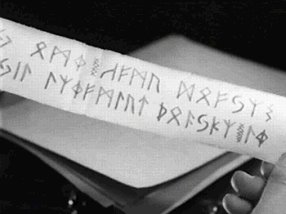
New Reviews:
Jarhead
Chicken Little
Save the Green Planet!
Paradise Now and The War Within

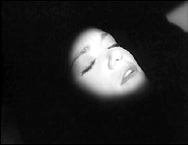

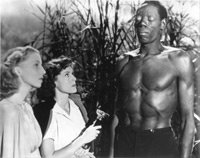

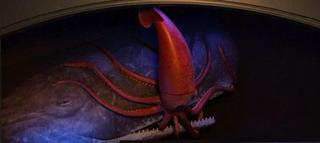


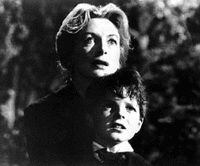
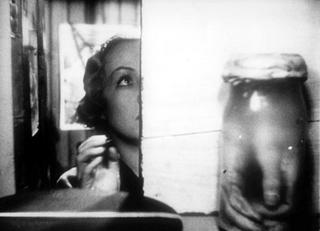
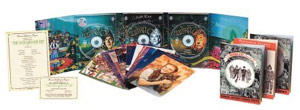
 I did see Capote, however, at an industry-only screening, and found myself sort of fascinated by the way that P.S. Hoffman seems trapped in his body the same way that Capote was trapped in his persona. There’s a real live boy in there and, a lot like Charles Laughton from a film generation or two ago, he’s leading man material crammed into the body and mug of a character actor. I’ve read him bristling a few times at being described as “chubby” – I think it hurts him more than you’d think to be thought of as an “ugly” guy when it seems clear that he’s gifted enough (unlike, say, Paul Giamatti who I still don’t get), to be something really special. When Capote makes a speech (a manipulative one) in the film that people often judge him by his appearance and come to the wrong conclusions – I had a hard time separating the actor from the ghost. Ditto his brief (too brief) turn as sainted critic Lester Bangs: dealing with similar identity/appearance issues. We talk a lot in “chick flicks” about the appearance of women (the gorgeous Toni Collette has made a cottage industry out of being “ugly” in them), but we don’t spend enough time I think with the extent that the male ego is attached to attractivity. It’s certainly not as important for a man to be gorgeous as, say, rich and influential – but I’d be lying if I said that there wasn’t a moment in Ocean’s 11 where I didn’t look at Pitt and Clooney in their awesome suits and have a neon-hued reminder of just how cruel – and sharp – is the ol’ pecking order. Anyway – there’s a lot of pain in P.S. Hoffman’s performance and I think I’m leaning towards a positive review of Capote because of it. The film itself is suspect from the start.
I did see Capote, however, at an industry-only screening, and found myself sort of fascinated by the way that P.S. Hoffman seems trapped in his body the same way that Capote was trapped in his persona. There’s a real live boy in there and, a lot like Charles Laughton from a film generation or two ago, he’s leading man material crammed into the body and mug of a character actor. I’ve read him bristling a few times at being described as “chubby” – I think it hurts him more than you’d think to be thought of as an “ugly” guy when it seems clear that he’s gifted enough (unlike, say, Paul Giamatti who I still don’t get), to be something really special. When Capote makes a speech (a manipulative one) in the film that people often judge him by his appearance and come to the wrong conclusions – I had a hard time separating the actor from the ghost. Ditto his brief (too brief) turn as sainted critic Lester Bangs: dealing with similar identity/appearance issues. We talk a lot in “chick flicks” about the appearance of women (the gorgeous Toni Collette has made a cottage industry out of being “ugly” in them), but we don’t spend enough time I think with the extent that the male ego is attached to attractivity. It’s certainly not as important for a man to be gorgeous as, say, rich and influential – but I’d be lying if I said that there wasn’t a moment in Ocean’s 11 where I didn’t look at Pitt and Clooney in their awesome suits and have a neon-hued reminder of just how cruel – and sharp – is the ol’ pecking order. Anyway – there’s a lot of pain in P.S. Hoffman’s performance and I think I’m leaning towards a positive review of Capote because of it. The film itself is suspect from the start.
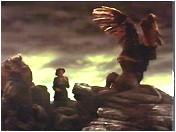 Watched Jan Svankmajer’s astonishing Alice back-to-back with the Dennis Potter-scripted Dreamchild - the former only available in a full-frame, dubbed DVD and the latter out of print in any format – played in conjunction (Henson’s Creature Shop provided beasties for Dreamchild) the two form a grand double bill. Svankmajer, Czech stop-motion animator extraordinaire (the inspiration for the work of The Brothers Quay amongst others), fashions from Carrol’s twisted tale a surreal exercise over-interested in scissors and writing desks. My dreams afterwards were dark, grotesque things. Really an amazing film and required viewing especially now that we’ve been primed by Aardman’s Wallace & Gromit. It goes places, does Alice, that you wish it wouldn’t. A prime example of what happens when archetype is accessed through an intimate understanding of source material and the perverse machinations of the lizard brain. A sequence with the caterpillar imagined as a room full of holes created by ravenously burrowing, phallic worms – and our Alice carefully taking off her shoes before entering – is nightmare territory and one of the only true evocations of the displacing surreality of Carroll’s prose and prosody. Dreamchild on the other hand, is a wonderful portal to Potter’s own pop surrealism that finds the nostalgia in Carroll’s pedophilic reveries. What is pedophilia on one level but an appreciation of ephemera? There’s menace in Dreamchild’s pitch black whimsy – the script, it goes without saying, is above reproach. Ian Holm, by the way, is the perfect Dodgson.
Watched Jan Svankmajer’s astonishing Alice back-to-back with the Dennis Potter-scripted Dreamchild - the former only available in a full-frame, dubbed DVD and the latter out of print in any format – played in conjunction (Henson’s Creature Shop provided beasties for Dreamchild) the two form a grand double bill. Svankmajer, Czech stop-motion animator extraordinaire (the inspiration for the work of The Brothers Quay amongst others), fashions from Carrol’s twisted tale a surreal exercise over-interested in scissors and writing desks. My dreams afterwards were dark, grotesque things. Really an amazing film and required viewing especially now that we’ve been primed by Aardman’s Wallace & Gromit. It goes places, does Alice, that you wish it wouldn’t. A prime example of what happens when archetype is accessed through an intimate understanding of source material and the perverse machinations of the lizard brain. A sequence with the caterpillar imagined as a room full of holes created by ravenously burrowing, phallic worms – and our Alice carefully taking off her shoes before entering – is nightmare territory and one of the only true evocations of the displacing surreality of Carroll’s prose and prosody. Dreamchild on the other hand, is a wonderful portal to Potter’s own pop surrealism that finds the nostalgia in Carroll’s pedophilic reveries. What is pedophilia on one level but an appreciation of ephemera? There’s menace in Dreamchild’s pitch black whimsy – the script, it goes without saying, is above reproach. Ian Holm, by the way, is the perfect Dodgson.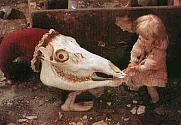 I’m interested as hell in Wes Craven’s announced adaptation of the terrifying Alice computer game – anyone hip to the progress of the project?
I’m interested as hell in Wes Craven’s announced adaptation of the terrifying Alice computer game – anyone hip to the progress of the project?

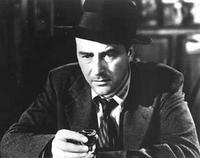
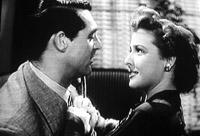 Also watched the surprisingly great Mr. Lucky (1943) - an all-but-forgotten Cary Grant flick in which he plays a character close to his heart: a guy who refused to go fight for his country during WWII. He brings to the swindler Joe (sort of a proto-Sky Masterson – knowing, of course, that the Damon Runyon collection upon which the musical is based was published in 1932) a real pathos that underlies the classic Grant screwball moments of his trying to learn how to knit and, of course, doing that ol’ Archie Leach shuck-and-jive of making the girls think you’re groovy while, all along, being a bit of a rascal. (The use of Cockney rhyming vernacular predicts the “Voodoo/hoodoo” shtick of the far better known The Bachelor and the Bobby Soxer.) Loraine Day appears as the “Sarah” of the piece, the woman of virtue and charity who falls for the rapscallion with a heart of gold. It’s true, Joe is a professional con man with gangster friends who is convinced by the virtue of a good woman to use his evil powers for the benefit of the war effort. A piffle? Perhaps, but it’s a piffle with a load of subtext and one of the only times, I think, that Grant in a non-Hitchcock performance was asked to dredge the deeps of his oiled charm and ease with unctuousness. Currently unavailable in the DVD format, it’s not worth an extended VHS search, but I’d pick it up on DVD when it finally comes home properly. God bless Gladys Cooper, by the way.
Also watched the surprisingly great Mr. Lucky (1943) - an all-but-forgotten Cary Grant flick in which he plays a character close to his heart: a guy who refused to go fight for his country during WWII. He brings to the swindler Joe (sort of a proto-Sky Masterson – knowing, of course, that the Damon Runyon collection upon which the musical is based was published in 1932) a real pathos that underlies the classic Grant screwball moments of his trying to learn how to knit and, of course, doing that ol’ Archie Leach shuck-and-jive of making the girls think you’re groovy while, all along, being a bit of a rascal. (The use of Cockney rhyming vernacular predicts the “Voodoo/hoodoo” shtick of the far better known The Bachelor and the Bobby Soxer.) Loraine Day appears as the “Sarah” of the piece, the woman of virtue and charity who falls for the rapscallion with a heart of gold. It’s true, Joe is a professional con man with gangster friends who is convinced by the virtue of a good woman to use his evil powers for the benefit of the war effort. A piffle? Perhaps, but it’s a piffle with a load of subtext and one of the only times, I think, that Grant in a non-Hitchcock performance was asked to dredge the deeps of his oiled charm and ease with unctuousness. Currently unavailable in the DVD format, it’s not worth an extended VHS search, but I’d pick it up on DVD when it finally comes home properly. God bless Gladys Cooper, by the way.
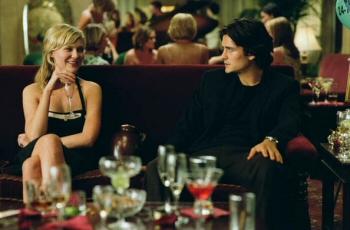 Heavy screening schedule last week with industry shots at
Heavy screening schedule last week with industry shots at 

